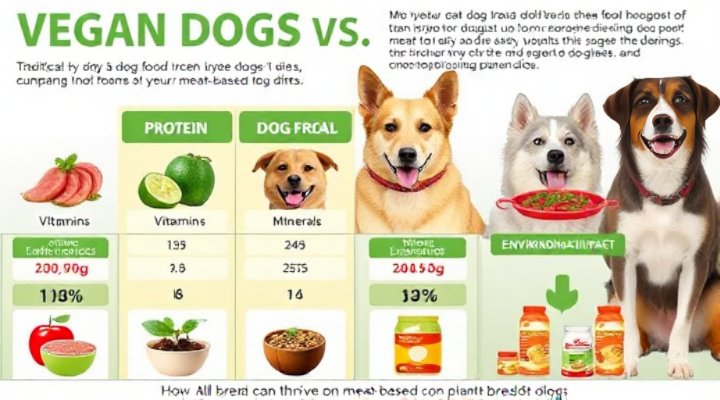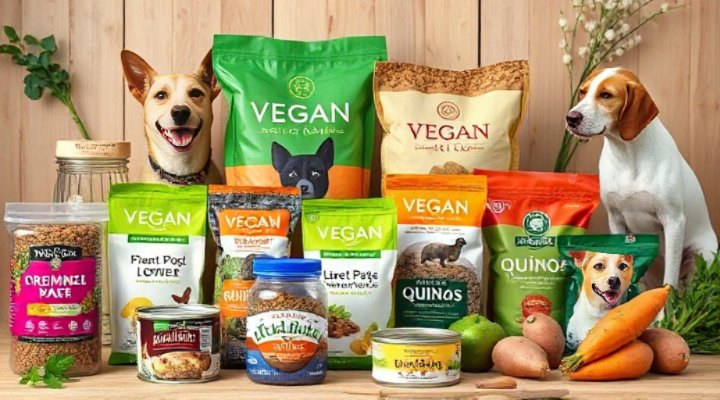Summary: Vegan dog food options and benefits represent an innovative approach to canine nutrition that, when properly implemented, can provide numerous health advantages. This comprehensive exploration covers nutritional adequacy, practical implementation strategies, and the significant benefits that plant-based diets offer for our canine companions’ wellbeing.

Understanding Vegan Dog Food Nutritional Adequacy
Many pet owners wonder about the nutritional completeness of vegan dog food options. Fortunately, modern veterinary nutrition science has made significant strides in developing plant-based diets that meet all of dogs’ nutritional requirements. According to research from the American Veterinary Medical Association, dogs are actually omnivores capable of thriving on properly formulated plant-based diets. That is to say, with careful planning and appropriate supplementation, vegan diets can provide complete nutrition for our furry friends.
Furthermore, the key to nutritional adequacy lies in ensuring proper protein sources, essential fatty acids, and vital nutrients that dogs need. For instance, lentils, chickpeas, and quinoa provide excellent plant-based protein, while flaxseed and algae oil offer omega-3 fatty acids. Most importantly, vitamin B12 supplementation is crucial, as this nutrient isn’t naturally available in plant sources. Consequently, choosing commercially prepared vegan dog foods that meet AAFCO standards ensures your pet receives balanced nutrition.
Health Benefits of Plant-Based Dog Food Options
The benefits of vegan dog food extend beyond ethical considerations to tangible health improvements. Many dogs experience better digestion, healthier skin and coat, and reduced allergy symptoms when switching to plant-based diets. Additionally, plant-based diets often contain higher fiber content, which promotes digestive health and can help maintain optimal weight.

Moreover, numerous studies indicate that dogs on well-formulated vegan diets may experience reduced risk of certain health issues. For example, research suggests potential benefits for dogs with food allergies, as plant-based diets eliminate common allergens found in traditional dog foods. Similarly, the anti-inflammatory properties of many plant ingredients can benefit dogs with arthritis or other inflammatory conditions. Meanwhile, the environmental benefits of reducing meat consumption add another layer of advantage to these dietary choices.
Implementing Vegan Diets Safely for Optimal Health
Transitioning your dog to a vegan diet requires careful planning and professional guidance. Firstly, consult with your veterinarian to ensure this dietary change is appropriate for your specific dog, considering factors like age, breed, and health status. Secondly, implement the transition gradually over 7-10 days, mixing increasing amounts of vegan food with their current diet to avoid digestive upset.
Furthermore, regular monitoring is essential during the transition period and beyond. Keep an eye on your dog’s energy levels, coat condition, and overall wellbeing. Additionally, schedule follow-up veterinary visits to check blood work and ensure nutritional needs are being met. For dogs with specific health concerns, our article on dog food allergies solutions provides additional guidance that complements vegan dietary approaches.

Commercial Vegan Dog Food Options and Selection
The market for vegan dog food has expanded significantly, offering various options to suit different preferences and budgets. From kibble to wet food and even freeze-dried options, pet owners now have numerous choices. When selecting commercial vegan dog food, look for products that meet AAFCO standards for complete nutrition and contain high-quality protein sources.
Additionally, consider your dog’s specific needs and preferences. Some dogs may prefer certain textures or flavors, so you might need to try different options. Likewise, pay attention to ingredient quality and sourcing. For those interested in complementary feeding approaches, our guide to organic dog food benefits offers valuable insights into selecting high-quality ingredients.
Homemade Vegan Dog Food Recipes and Preparation
For pet owners who prefer preparing meals at home, creating balanced vegan dog food requires careful recipe formulation. Essential components include protein sources (lentils, chickpeas, tofu), carbohydrates (sweet potatoes, brown rice, oats), healthy fats (flaxseed oil, coconut oil), and necessary supplements (vitamin B12, taurine, L-carnitine).
However, homemade diets require particular attention to nutritional balance. The FDA provides guidelines for pet food safety that home preparers should follow. Moreover, consider consulting with a veterinary nutritionist to ensure your homemade recipes meet all nutritional requirements. Meanwhile, our article on real dog food selection offers additional guidance on choosing quality ingredients.

Monitoring Health and Adjusting Vegan Diets
Regular health monitoring is crucial when feeding any specialized diet, including vegan options. Schedule veterinary check-ups every 6-12 months to assess your dog’s overall health and nutritional status. Blood tests can help identify any potential deficiencies early, allowing for dietary adjustments or supplementation.
Furthermore, observe your dog’s daily condition closely. Healthy signs include good energy levels, shiny coat, normal bowel movements, and maintained muscle mass. If you notice any concerning changes, consult your veterinarian promptly. Additionally, be prepared to adjust the diet as your dog ages or if health conditions develop. For comprehensive nutritional guidance, our piece on sensitive stomach solutions provides valuable complementary information.
Common Concerns and Myths About Vegan Dog Diets
Many concerns about vegan dog diets stem from misconceptions rather than scientific evidence. One common myth suggests dogs cannot digest plant-based proteins efficiently, but research shows dogs digest plant proteins nearly as well as animal proteins when properly prepared. Another concern involves nutrient deficiencies, but with proper formulation and supplementation, vegan diets can meet all nutritional requirements.
Moreover, some worry about palatability, but most dogs readily accept well-formulated vegan foods, especially when introduced gradually. Importantly, every dog is individual, and what works for one may not work for another. Therefore, careful observation and professional guidance remain essential throughout the process.
Long-Term Success with Vegan Dog Nutrition
Achieving long-term success with vegan dog food involves commitment, education, and ongoing attention to your dog’s needs. Stay informed about the latest nutritional research and product developments in the vegan pet food market. Additionally, maintain open communication with your veterinarian and be willing to adjust the diet as needed based on your dog’s changing requirements.
Furthermore, consider joining online communities or local groups of pet owners who feed vegan diets. These communities can provide valuable support, recipe ideas, and product recommendations. Most importantly, remember that the goal is your dog’s health and happiness—if the vegan diet isn’t working for your particular dog, be willing to explore other nutritional options that better suit their needs.
Keywords: vegan dog food, plant-based nutrition, canine health benefits, ethical pet feeding, sustainable dog food, vegetarian dog diet, animal-free pet nutrition, complete plant protein, dog food alternatives, environmentally friendly pet food

